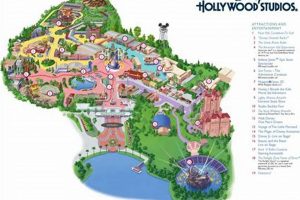The facilities known as Hollywood Studios and Universal Studios represent distinct entities within the entertainment landscape. One is a theme park owned and operated by The Walt Disney Company, while the other is a combination of working film and television studios and a theme park owned by NBCUniversal.
Understanding the difference between these two locations is crucial for effective travel planning and expectations management. Historically, both have contributed significantly to the landscape of themed entertainment, but their ownership and creative direction remain separate. This impacts the intellectual properties featured, the overall park experience, and the specific attractions offered.
The following sections will further clarify the distinctions in ownership, location, attractions, and overall thematic focus to provide a complete comparison. This detailed analysis aims to eliminate confusion and enable informed decision-making for prospective visitors.
Careful consideration of key differences is essential when planning a visit to either Hollywood Studios or Universal Studios. The following provides actionable advice for discerning travelers.
Tip 1: Location Matters: Verify the specific location. “Hollywood Studios” is exclusively at Walt Disney World Resort in Orlando, Florida. “Universal Studios” has multiple locations globally, including Orlando and Hollywood, California. Confirm the intended destination to avoid confusion.
Tip 2: Ownership and Intellectual Property: Recognize the owning corporation dictates the thematic elements. Hollywood Studios predominantly features Disney-owned properties, including Pixar, Marvel, and Star Wars. Universal Studios showcases properties owned by NBCUniversal, such as Harry Potter, Jurassic Park, and Illumination Entertainment franchises.
Tip 3: Attraction Focus: Investigate the ride and show offerings. Hollywood Studios focuses heavily on immersive experiences and stage shows, while Universal Studios often integrates cutting-edge technology with intense thrill rides.
Tip 4: Target Audience: Consider the intended audience. While both parks cater to a wide demographic, Hollywood Studios often appeals to families with younger children due to its reliance on classic Disney characters. Universal Studios, particularly its thrill rides, may be more suited to older children and adults.
Tip 5: Budgetary Planning: Review pricing structures. Ticket prices, dining costs, and merchandise expenses vary between the two parks. Compare packages and promotions to determine the most cost-effective option for the desired experience.
Tip 6: Time of Year: Factor in seasonal variations. Crowd levels, weather conditions, and special events influence the overall park experience. Research typical patterns for the intended travel dates to optimize the visit.
Tip 7: Travel Time: Estimate transit time. If visiting multiple theme parks, account for travel time between locations. Walt Disney World requires internal transportation, while Universal Orlando Resort allows walkable access between its parks.
A thorough understanding of these distinct elements ensures a more tailored and enjoyable theme park adventure. Thoughtful planning, considering the unique attributes of each destination, is key.
The subsequent sections will provide a comparative analysis of specific attractions, further illustrating the divergence between these two iconic entertainment destinations.
1. Ownership and Operation
The identity of any theme park is inextricably linked to its ownership and operation. Examining these factors is paramount in understanding how Hollywood Studios and Universal Studios are distinct. Ownership dictates creative control, intellectual property usage, and financial investment, ultimately shaping the visitor experience.
- Corporate Affiliation
Hollywood Studios operates under the umbrella of The Walt Disney Company, a global leader in entertainment. This affiliation allows the park to leverage Disney’s vast library of characters, stories, and intellectual properties, resulting in attractions and shows based on Disney, Pixar, Marvel, and Star Wars franchises. Conversely, Universal Studios is owned by NBCUniversal, a subsidiary of Comcast. This gives it access to properties like Harry Potter, Jurassic Park, and characters from Illumination Entertainment. The divergence in corporate affiliation creates two distinct thematic universes within the theme park landscape.
- Operational Strategies
Operational control influences aspects such as ticket pricing, park hours, and crowd management strategies. Disney implements its proprietary FastPass+ (now replaced by Genie+ and Lightning Lane) system at Hollywood Studios, aiming to optimize guest flow. Universal Studios utilizes its Express Pass system for similar purposes. Operational philosophies regarding park maintenance, staffing levels, and guest service standards also contribute to differing experiences. These strategies are core to overall guest satisfaction.
- Creative Direction and Theming
Ownership influences the overall creative direction. Disney’s Hollywood Studios often leans toward idealized versions of Hollywood’s golden age, infused with the magic and fantasy associated with Disney. In contrast, Universal Studios leans towards a more immersive, action-oriented approach, often mirroring the environments and atmosphere of the films they represent. Creative input and thematic guidelines are internally driven by ownership and implemented by operational teams. This manifests in distinct architectural styles, landscaping choices, and atmospheric details.
- Financial Investment and Expansion
The parent company’s financial performance and investment priorities directly impact the park’s ability to expand and innovate. Disneys substantial investments into Hollywood Studios, such as the creation of Star Wars: Galaxy’s Edge, showcase this commitment. Similarly, Universal’s investments in expanding the Wizarding World of Harry Potter demonstrate NBCUniversals strategic priorities. Financial backing enables the addition of new attractions, technologies, and amenities, keeping the park fresh and competitive within the entertainment industry. Capital investment creates new destinations for guest to visit.
In summary, corporate ownership and operational control serve as the foundation for the distinct identities of Hollywood Studios and Universal Studios. The parent companies, their intellectual property assets, and their strategic priorities shape every facet of the visitor experience, from attraction selection to overall thematic immersion. Understanding these differences is essential for anyone planning a visit to these destinations. They impact the content and context for the experience.
2. Geographic Location
Geographic location is a fundamental differentiator between Hollywood Studios and Universal Studios. The presence of these parks in distinct locations significantly shapes visitor experiences, impacting accessibility, thematic context, and the overall regional tourism ecosystem.
- Orlando vs. Hollywood
Hollywood Studios is exclusively located at Walt Disney World Resort in Orlando, Florida. Universal Studios maintains a presence in both Orlando, Florida (Universal Orlando Resort) and Hollywood, California (Universal Studios Hollywood). This multiplicity immediately highlights a crucial distinction: the physical park named “Hollywood Studios” does not exist in Hollywood, California. Universal Studios, on the other hand, offers a namesake experience in its historic Hollywood location. This is very vital to “is hollywood studios and universal studios the same”.
- Accessibility and Regional Tourism
The Orlando locations benefit from the established tourism infrastructure of Central Florida, a region renowned for its theme parks and family-friendly destinations. Hollywood Studios leverages this infrastructure and benefits from the synergistic effects of being part of the larger Walt Disney World complex. Universal Orlando Resort similarly thrives within this ecosystem, attracting visitors seeking a broader range of entertainment options. Universal Studios Hollywood, however, draws upon the allure of the film industry and the existing tourism market of Southern California, offering a different regional context.
- Thematic Resonance
While both locations thematically relate to the film industry, their geographic settings contribute to different interpretive experiences. Universal Studios Hollywood benefits from its proximity to actual movie studios, offering studio tours and emphasizing the behind-the-scenes aspects of filmmaking. Hollywood Studios, while themed to the same industry, exists within the fabricated world of Disney, creating a more theatrical and less directly realistic experience. This reality vs fantasy theme is also important when defining “is hollywood studios and universal studios the same”.
- Operational Considerations
Geographic location also influences operational factors such as staffing, supply chains, and local regulations. The distinct labor markets and regulatory environments of Florida and California necessitate different operational strategies. Weather patterns also play a significant role, impacting attraction operation and visitor comfort, which further differentiate experiences at similar times of the year. Park managers need to focus on how the weather is affecting the park. Therefore, operational conditions is also vital for distinguishing “is hollywood studios and universal studios the same”.
The geographic separation of these entities, and the differing regional contexts in which they operate, reinforces their distinct identities. Location influences everything from visitor demographics and accessibility to the overarching thematic resonance and daily operations, cementing the fundamental truth that Hollywood Studios and Universal Studios, while thematically related, are not the same entity. This point is crucial for anyone planning a visit or discussing the theme park industry.
3. Intellectual Property
Intellectual property serves as a primary distinguishing factor when considering whether Hollywood Studios and Universal Studios are the same. The rights to characters, stories, and cinematic worlds dictate which franchises are featured within each park, creating fundamentally different immersive experiences.
- Disney vs. NBCUniversal Properties
Hollywood Studios primarily showcases intellectual properties owned by The Walt Disney Company, including those acquired through Pixar, Marvel Entertainment, and Lucasfilm. This translates to attractions and shows featuring characters from Star Wars, Toy Story, and various Marvel franchises. Conversely, Universal Studios predominantly features properties owned by NBCUniversal, such as the Wizarding World of Harry Potter, Jurassic Park, and characters from Illumination Entertainment’s Despicable Me. The choice of properties showcased depends on corporate ownership, and therefore distinguishes “is hollywood studios and universal studios the same”.
- Licensing Agreements and Exclusivity
Theme parks frequently enter into licensing agreements to feature intellectual property they do not directly own. These agreements dictate the terms of usage, including the duration, scope, and degree of creative control. The presence or absence of certain franchises can be attributed to these licensing agreements. Moreover, exclusivity clauses may prevent competing parks from featuring similar properties. Parks that make exclusive rights to intellectual properties, demonstrate that “is hollywood studios and universal studios the same” is not true.
- Creative Interpretation and Adaptation
The manner in which intellectual property is adapted into theme park attractions varies significantly. Some parks prioritize faithful recreations of cinematic scenes, while others employ more imaginative interpretations. This creative adaptation is influenced by the park’s overall thematic vision and the perceived expectations of its target audience. For Hollywood Studios, the focus is often on capturing the magic of Disney storytelling. Universal Studios, by contrast, leans towards immersive and thrilling experiences based on cinematic worlds. These distinct adaptation techniques affect how guests engage with characters and narratives. This shows that “is hollywood studios and universal studios the same” is false.
- Impact on Guest Demographics
The intellectual property featured within a theme park significantly influences its target audience. Parks with a strong emphasis on family-friendly properties tend to attract younger children and their parents. Those featuring more intense or mature content may appeal to older audiences. The specific mix of franchises showcased therefore determines the park’s demographic profile and its overall marketing strategy. Because of Intellectual Property, each park is appealing to different audience, emphasizing “is hollywood studios and universal studios the same” is false.
The intellectual properties showcased within Hollywood Studios and Universal Studios are central to their distinct identities. The choice of franchises, the terms of licensing agreements, and the creative interpretations applied all contribute to differing visitor experiences. Therefore, intellectual property acts as a clear and definable aspect when discerning “is hollywood studios and universal studios the same”.
4. Attraction Categories
Attraction categories serve as a significant factor in differentiating Hollywood Studios and Universal Studios. The types of rides, shows, and interactive experiences offered contribute substantially to the overall character of each park, influencing visitor expectations and satisfaction. A direct correlation exists between attraction categories and the perception of whether Hollywood Studios and Universal Studios are the same: differing categories reinforce their distinction, while similarities might lead to confusion. For instance, Hollywood Studios’ emphasis on stage shows and immersive environments, like Star Wars: Galaxy’s Edge, contrasts with Universal Studios’ focus on thrill rides and simulator-based attractions, exemplified by the Harry Potter and Jurassic Park franchises. This divergence in attraction categories stems from corporate strategy and chosen intellectual property.
The relative importance of various attraction categories within each parks overall appeal highlights their distinct natures. Hollywood Studios relies heavily on the emotional connection guests have with Disney characters and stories, making parades, character meet-and-greets, and stage productions central to its offerings. Universal Studios, conversely, prioritizes cutting-edge technology and intense physical sensations, investing in roller coasters and 3D simulator experiences. This differentiation is not merely superficial; it reflects deliberate choices about how to entertain and engage audiences, aligning with the properties they feature. Consider the practical implications: a family with young children primarily interested in character interactions may find Hollywood Studios more appealing, while thrill-seekers might prefer Universal Studios.
In summary, analyzing attraction categories provides valuable insight into the question of whether Hollywood Studios and Universal Studios are the same. The mix of rides, shows, and experiences, and the relative prominence of each category, underscores the fundamental differences between these parks. Although both destinations offer elements of entertainment, the approach to attraction design and the reliance on specific categories of experiences contribute significantly to their unique identities. Understanding these differences is crucial for prospective visitors seeking an experience tailored to their preferences. Therefore, different attraction categories make it clear that “is hollywood studios and universal studios the same” is false.
5. Thematic Immersion
Thematic immersion, the degree to which a theme park creates a believable and engaging environment, directly impacts the perception of whether Hollywood Studios and Universal Studios are the same. A higher degree of immersion amplifies the distinct identity of each park, clarifying that they are not interchangeable. For example, Star Wars: Galaxy’s Edge at Hollywood Studios presents a highly detailed and interactive environment designed to fully transport visitors to a galaxy far, far away. Similarly, the Wizarding World of Harry Potter at Universal Studios uses meticulous architectural recreations and interactive spell-casting opportunities to create a convincing magical realm. The success of these immersive experiences underscores the unique nature of each park, differentiating them in the minds of visitors.
Without effective thematic immersion, the distinctions between parks would blur. The lack of immersion could lead to a generic theme park experience. Hollywood Studios, however, creates a thematic journey into the world of film and television production, albeit filtered through the lens of Disney’s storytelling. This strategy is contrasted by Universal Studios which focuses on recreating the environments of specific franchises like Jurassic Park, emphasizing adventure and thrills. These are a few examples of how important thematic immersion is to making “is hollywood studios and universal studios the same” false.
Therefore, the level of thematic immersion is not simply an aesthetic choice but a fundamental component of the overall theme park experience. Enhanced immersion reinforces unique themes and distinguishes one park from another. The practical significance of this understanding lies in visitor satisfaction. By recognizing the unique identities of Hollywood Studios and Universal Studios, guests can make informed decisions and choose the destination that best aligns with their preferences. Thus, the high-quality thematic immersion makes it clear that “is hollywood studios and universal studios the same” is false.
Frequently Asked Questions
The following questions address common points of confusion regarding the distinction between Hollywood Studios and Universal Studios. The aim is to provide clear and concise answers to facilitate informed decision-making.
Question 1: Are both Hollywood Studios and Universal Studios located in Hollywood, California?
No. Universal Studios has a location in Hollywood, California (Universal Studios Hollywood). Hollywood Studios is exclusively located at Walt Disney World Resort in Orlando, Florida, and has no presence in Hollywood, California.
Question 2: Do both parks feature intellectual property from The Walt Disney Company?
Hollywood Studios primarily showcases intellectual properties owned or licensed by The Walt Disney Company. Universal Studios features properties owned by NBCUniversal, along with some licensed properties, but does not generally feature Disney-owned content.
Question 3: Are the same types of rides and attractions found at both parks?
While both parks offer rides, shows, and dining experiences, the specific types and themes differ significantly. Hollywood Studios tends to emphasize immersive experiences and stage productions related to Disney properties, whereas Universal Studios often focuses on thrill rides and cinematic recreations from its own franchises.
Question 4: Is admission to one park valid for entry into the other?
No. Hollywood Studios and Universal Studios are independently owned and operated, and each requires separate admission tickets. A ticket purchased for one park does not grant access to the other.
Question 5: Do both parks offer similar levels of thematic immersion?
Both parks strive for thematic immersion, but their approaches and specific execution vary. Hollywood Studios immersion often centers on the idealized world of Hollywood and Disney storytelling, while Universal Studios prioritizes recreating the environments of specific film franchises. The degree and style of immersion are therefore distinct.
Question 6: Is either park considered a working movie studio?
Universal Studios Hollywood includes a working movie studio and offers studio tours. Hollywood Studios in Orlando does not function as a working movie studio in the same capacity, although it may host some filming activities on occasion.
In summary, while both Hollywood Studios and Universal Studios are theme parks with film-related themes, significant differences exist regarding location, ownership, intellectual property, attractions, and immersion. These distinctions clarify that they are not the same entity.
The next section will provide a conclusive summary, reinforcing the core differences between these destinations.
Concluding Assessment
This exploration definitively establishes that Hollywood Studios and Universal Studios are not the same. Key differentiators include ownership, location, featured intellectual properties, dominant attraction categories, and approaches to thematic immersion. These elements collectively contribute to distinct visitor experiences, precluding the notion of interchangeability. Understanding these fundamental differences is crucial for informed decision-making in the context of travel planning and entertainment consumption.
Given the established distinctions, prospective visitors are encouraged to thoroughly research each destination to align their choices with individual preferences. The continued evolution of theme park experiences suggests that these differences will likely become more pronounced over time. Thus, a clear understanding of these nuances remains essential for navigating the entertainment landscape.







